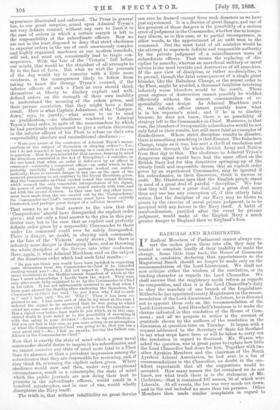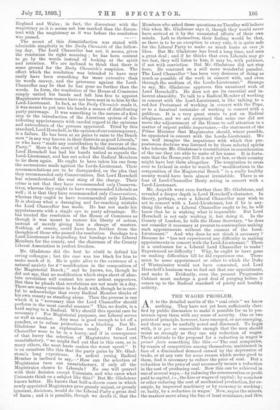RADICALS AND MAGISTRATES.
IF Radical Members of Parliament cannot always con- vert the inches given them into ells, they may be trusted to complain loudly of their inability to make the change. Some little time back, the House of Commons passed a resolution declaring that appointments to the Magisterial Bench should no longer be made only on the recommendatiom of the Lord-Lieutenant. We shall not now criticise either the wisdom of the resolution, or its binding character as regards the Lord Chancellor. We shall assume that the magistracy needs reform as regards its composition, and that it is the Lord Chancellor's duty to obey the mandate of one branch of the Legislature. Hitherto he has appointed county Magistrates on the recom- mendation of the Lord-Lieutenant. In future, he is directed not to appoint them only on the recommendation of the Lord-Lieutenant. Lord Herschell's business is to make the change indicated in this resolution of the House of Com- mons; and all we propose to notice is the amount of gratitude shown by the authors of the resolution in the discussion at question-time on Tuesday. It began with a request addressed to the Secretary. of State for Scotland to say what steps have been or will be taken to carry out the resolution in regard to Scotland. Mr. Wason, who asked the question, was at great pains to explain how little the Lord Chancellor had done for him. Together with two other Ayrshire Members and the chairman of the North Ayrshire Liberal Association, he had sent in a list of recommendations to the Chancellor, no doubt in the con- fident expectatia that all the suggestions would be accepted. How many names the list contained we do not know, nor what truth there is in the statement of Mr. Cochrane,—that it contained 107 names, 96 of which were Liberals. At all events, the list was very much cut down, and in the end included no.more than ten persons. Other Members then made similar complaints in regard to England and Wales ; in fact, the discontent with the magistracy as it is seems not less marked than the discon- tent with the magistracy as it was before the resolution was passed. The secret of this dissatisfaction was stated with admirable simplicity in the Daily Chronicle of the follow- ing day. The Lord Chancellor has not, it seems, given the resolution its right meaning ; he has been content to go by the words instead of looking at the spirit and intention. We are inclined to think that there is some ground for the Daily Chronicle's suspicion. The effect which the resolution was intended to have may easily have been something far more extensive than its words convey, and the grievance against the Lord- Chancellor may be that he has gone no further than the words. In form, the resolution of the House of Commons simply untied his hands and left him free to appoint Magistrates whose names have not been sent in to him by the Lord-Lieutenant. In fact, as the Daily Chronicle reads it, it was meant to put into his hands a means of distributing party patronage. It was something in the nature of a first step to the introduction of the American system of dis- tributing appointments with careful regard to the opinions and antecedents of the persons appointed. Tried by this standard, Lord Herschell, in the opinion of our contemporary, is a failure. He has been at no pains to raise to the Bench men " in any way known in their districts as good Liberals," or who have "made any contribution to the success of the Party." Here is the secret of the Radical dissatisfaction. Lord Herschell has had his hands untied as regards the Lord-Lieutenant, and has not asked the Radical Members to tie them again. He ought to have taken his cue from the accusations made against the Lords-Lieutenant. Their recommendations are to be disregarded, on the plea that they recommended only Conservatives. But Lord Herschell has misunderstood the real sting of the charge. Their crime is not that they have recommended only Conserva- tives, whereas they ought to have recommended Liberals as well ; it is that they have recommended only Conservatives, whereas they ought to have recommended only Liberals. It is obvious what a damaging and far-reaching mistake the Lord Chancellor has made. He has not made his appointments with a single eye to party advantage. He has treated the resolution of the House of Commons as though it was meant to restore his liberty of action, instead of merely giving him a change of masters. Nothing, of course, could have been further from the thoughts of those who passed the resolution. Bondage to a Lord-Lieutenant is degrading, but bondage to the Liberal Members for the county, and the chairman of the County Liberal Association is perfect freedom.
Mr. Gladstone did the best he could to defend his erring colleague ; but the case was too black for him to make much of it. He is quite alive to the existence of a natural anxiety for if "modification in the composition of the Magisterial Bench ; " and he knows, too, though he did not say, that no modification which stops short of abso- lute revolution will content his more ardent supporters. But then he pleads that revolutions are not made in a day. There are many counties to be dealt with, though he is care- ful to acknowledge that every Radical Member thinks of his own county as standing alone. Then the process is one which it is "necessary that the Lord Chancellor should i perform n the most careful manner." This, no doubt, is a liard saying to a Radical. Why should this special care be necessary ? For Magisterial Purposes, one Liberal serves as well as another. Any man is good enough to let off a poacher, or to refuse protection to a blackleg. But Mr. Gladstone has an explanation ready. If the Lord Chancellor were to be in a hurry, and if in consequence of that hurry the selection of Magistrates turned out unsatisfactory, "we might find out that in this case, as in many others, the. most haste makes the worst speed." It is on occasions like this that the party gains by Mr. Glad- stone's long experience. An ardent young Radical Member is inclined to say,_ • How can the selection of Magistrates turn out unsatisfactory, if only all the Magistrates chosen be Liberals P No one will quarrel with their decision except Unionists, and who cares what Unionists think on a subject like this ?' But Mr. Gladstone knows better. He knows that half-ad oxencases in which newly appointed Magistrates gave grossly unjust, or grossly ignorant, decisions, would do the Liberal Party a great deal ' of harm ; and it is possible, though we doubt it, that the Members who asked these questions on Tuesday will believe this when Mr. Gladstone says it, though they would never have arrived at it by the unassisted efforts of their own minds. Left to themselves, their feeling would be that, as there is to be an exception to every rule, it is quite safe for the Liberal Party to make as much haste as ever it likes. But Mr. Gladstone has lived a long time, and seen a great deal ; and if he thinks that even Liberals may go too fast, they will listen to him, it may be, with patience, if not with conviction. But Mr. Gladstone did not stop here. He ventured on a still more wonderful paradox. The Lord Chancellor "has been very desirous of doing as much as possible of the work in concert with, and even through the medium of, the Lords-Lieutenant." Strange to say, Mr. Gladstone approves this unnatural wish of Lord Herschell's. He does not see its essential and in- herent absurdity. To talk to a Radical Member of working in concert with the Lord-Lieutenant, is like talking to a red-hot Protestant of working in concert with the Pope, or to a fanatical teetotaler of working in concert with a publican. It is a very great strain to put on Radical allegiance, and we are surprised that some one did not move the adjournment of the House to call attention to a matter of urgent public importance,—the statement of the Prime Minister that Magistrates should, where possible, be appointed in concert with the Lords-Lieutenant. We can well imagine the impatience with which this pre- posterous doctrine was listened to by those selected spirits who tolerate Mr. Gladstone's eccentricities in consideration of the use they are able to make of his name. It is fortu- nate that the Home-rule Bill is not yet law, or their country might have lost them altogether. The temptation to cross over to Ireland in order to watch the" modifications in the composition of the Magisterial Bench" in a really healthy society would have been almost irresistible. There is no fear of Lord-Chancellor Healy acting in concert with a Lord-Lieutenant.
Mr. Asquith went even further than Mr. Gladstone, and revealed a deeper depth in Lord Herschell's character. In theory, perhaps, even a Liberal Chancellor may wish to act in concert with a Lord-Lieutenant, but if he is any- thing like what a Liberal Chancellor ought to be, he will know that he is wishing what is impossible. But Lord Herschell is not only wishing it, but doing it. In the County of London, he tells the Home Secretary, "he does not consider it necessary at present to contemplate making such appointments without the consent of the Lord- Lieutenant." And why does he not think it necessary ? Because he "has not experienced any difficulty in making appointments in concert with the Lord-Lieutenant." There is a, confession for a Liberal Lord Chancellor to make ! Experienced no difficulty ! Why, he ought to have gone on making difficulties till he did experience one. There must be some appointment or other to which the Duke of Westminster would not have consented, and Lord Herschell's business was to find out that one appointment, and make it. Evidently, even the present Progressive Cabinet must undergo a good deal of purging before it comes up to the Radical standard of purity and healthy activity.



































 Previous page
Previous page